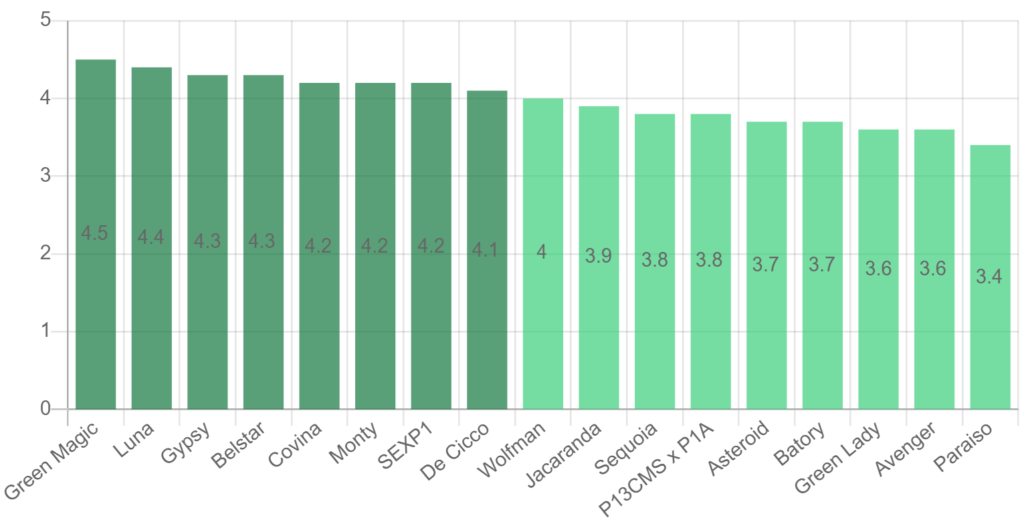It’s time to sign up for 2022 Collaborative Trials on SeedLinked. We invite you to be part of our mission to make the seed system more collaborative and transparent by signing up to be part of trials on SeedLinked in 2022! Participating in trials is a great way to:
- Grow new and exciting varieties before they are released commercially
- To help provide vital feedback on how the varieties perform on the SeedLinked platform
- Participate in an open discussion on the trial community feed
- Get instant access to trial results when you submit your feedback
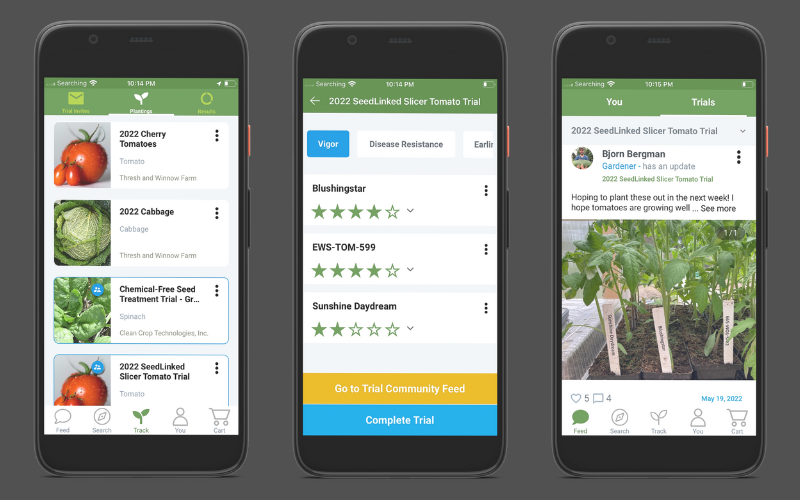
What am I committing to when I sign up to be part of a trial? The trial manager will send you seeds and will ask you to grow out each variety and submit your reviews, comments, and photos on each variety on the SeedLinked website and/or app during the growing season. The manager for each trial will communicate more specific details about participating in each individual trial.
Check out what trials are available below. Note that this page will be updated frequently with new trials, so check back often.
2022 Albert Lea Seed Annual Clover Winter Hardiness Trial – Registration Closed
This cover crop trial, put on by Albert Lea Seed, is focused on testing the germination, vigor, and winter hardiness of four varieties of clover: generic ‘Variety Not Stated’ (VNS) versions of crimson and berseem clover, ‘Fixation’ balansa clover, and ‘Frosty’ berseem clover. Seed will be shipped in July, and participants are asked to plant a 4′ x 6′ plot of each clover two months before their average first freeze date (see the ‘Historical Date of First Freeze’ map). Winter killed clovers (which these varieties usually are) can be a great way to prep a plot for next year’s spring or summer crops, but some of these varieties might survive and you will be asked to collect data into spring 2023, so keep that in mind when choosing a location for this trial. Learn more and sign up for this trial below.
2022 Clean Crop Tech Chemical-Free Seed Treatment Spinach Trial – Registration Closed
Join this trial at the cutting edge of chemical-free seed treatments. Clean Crop Tech is working on seed treatment options to improve germination rates and time, vigor, and resilience to plant stress. We invite you to be a part of testing the next generation of sustainable seed treatment!* This trial will include one check variety (Space (F1) Spinach) and three variations of CCT’s treatment process on the same variety. Germination may differ by just a couple days – but even that makes a difference for baby green production – so keep a close eye on this quick trial! Seed will be shipped late April, with a target planting date of mid-late May (not before, since bolting tolerance is one of the traits of interest).
*Please note: CleanCropTech’s treatment is not organically certified! However, it does not use any radiation or harmful chemicals. The treatment is an electrical process, chemical-free, and leaves no residues, functioning by special scarification of the surface of the seed. Increasing surface area helps seeds absorb water and thus germinate more quickly and be more resilient to stress. If you are a certified organic grower please check with your certifier or plant the trial in an area outside of your certified growing zones. Although we are hopeful this will eventually be an innovative seed treatment option available to organic growers (this trial is part of the final stages of R&D), the process has not been reviewed by OMRI, and SeedLinked and CCT are not responsible for any issues with organic certification.
2022 Seed to Kitchen Collaborative Trials Sign Up – Registration Closed
Seed to Kitchen Collaborative will send each grower seeds, planting stakes, a planting map, and datasheets. They will be sent by the end of February. Growers manage the trial as they would manage their normal crop. Trials are limited to growers in the Midwest. Learn more about the trials on the SKC trials website.
Seed to Kitchen Collaborative (SKC) trials this year include four different tomato breeding trials, a pepper breeding trial and potato trials with breeding lines from the University of Wisconsin program.
SKC Variety Trials:
SKC Breeding Trials:
2022 Midwest Broccoli Trial Sign Up – Registration Closed
Are you a farmer or gardener located in the upper midwest (Minnesota, Wisconsin, Michigan, North Dakota, and South Dakota)? Do you like growing broccoli? Are you interested in being part of research to identify varieties that are more resistant to black rot and Alternaria? If you answered yes to all those questions, sign up to be part of our 2022 trials! Trials are a collaboration of SeedLinked and the Minnesota Fruit and Vegetable Growers Association with funding from the Minnesota Department of Agriculture’s Specialty Crop Block Grant.
2022 SeedLinked Slicer Tomato Trial – Registration Closed
Do you love tomatoes? Join us for this collaborative trial!
From mouth-watering BLTs to a picturesque case of blemish-free tomatoes, sometimes slicers and beefsteaks are just what you need. This trial features 12 new slicer/beefsteak tomato varieties from some of the industry’s most innovative breeders. Participating breeders include: Artisan Seeds, Earthworks Seed, Johnny’s Selected Seeds, PanAmerican Seeds, Vitalis Organic Seeds, Siskiyou Seeds, and Wild Mountain Seeds. If you join the trial, you’ll receive a subset of 3 varieties to compare, and 10 seeds of each variety. Seeds will be shipped out the first week of March 2022. You’ll be asked to plant at least 3 plants per variety in the same setting. The plant breeders have a special interest in comparing open field/garden and hoop house/caterpillar tunnel environments. Be sure to fill out the management info at the end of the trial season! Open to USA growers only.
2022 Seed Savers Exchange ADAPT Trials Sign Up – Registration Closed
The Community Science ADAPT program is a fun and exciting way to get involved in Seed Savers Exchange’s (SSE) mission of preserving and sharing our food crop heritage. Participants in this program trial varieties from the SSE seed bank and send them feedback on their performance. This information helps SSE better understand the adaptability of these varieties to different environments and guides their selection process for new introductions into their seed catalog.
In early January each year, SSE releases details on the collaborative trials they’re offering for the upcoming season. Participants select the crop(s) they want to trial and are then randomly assigned three varieties. In the first week of March, SSE will send you your seeds, plant labels, a datasheet, and instructions for submitting your data. They ask that you grow the three varieties side-by-side under the same conditions. They do not require a minimum number of plants. You will be evaluating each variety on a handful of key characteristics, including yield, flavor, earliness, appearance, and disease resistance. Learn more on the SSE ADAPT Website.
Updated 6/7/2022
Natalie Hoidal, Charlie Rohwer, Nicolas Enjalbert, 80+ farmers and gardeners
Report reprinted with permission from authors. Link to original report here.
7 minute read
We conducted a replicated broccoli trial at the Southern Research and Outdoor Center (SROC) in Waseca, Minnesota, where we inoculated plots with black rot (Xanthamonascampestris pv. campestris). We also partnered with 80 farmers and gardeners to conduct mini-trials at their farms (Figure 1). Our goal was to screen for varieties of broccoli with tolerance to the pathogens black rot (Xcc) and Alternaria (Alternaria brassicicola). This report outlines preliminary results from the trials. Due to the hot, dry summer in the Midwest, disease pressure was minimal, particularly in the early planting.
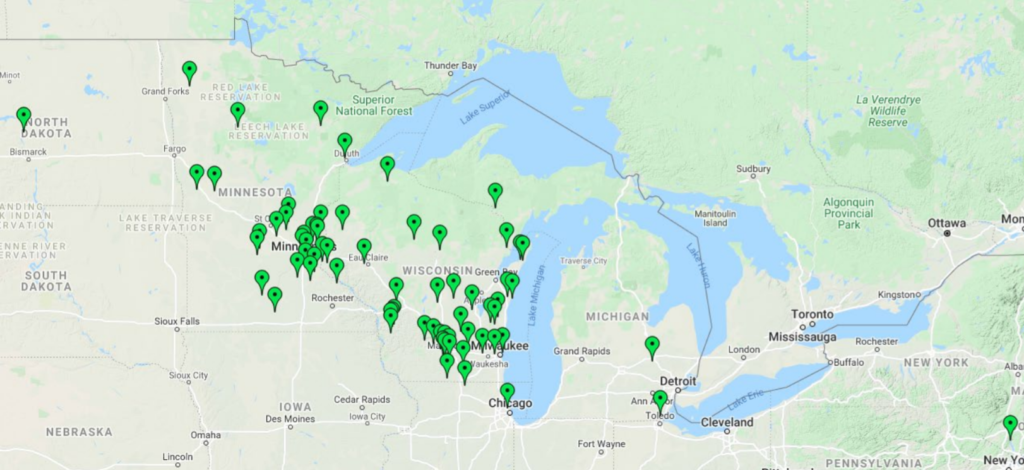
This trial was completed in collaboration with SeedLinked platform and the Minnesota Fruit & Vegetable Growers Association with funding from the Minnesota Department of Agriculture Specialty Crop Block Grant.
2022 Midwest Broccoli Trial Sign Up – Registration Closed
Before we dive into the 2021 trial results, we want to invite farmers and gardeners located in the upper midwest (Minnesota, Wisconsin, Michigan, North Dakota, and South Dakota), who like growing broccoli and are interested in being part of our continued research to identify varieties that are more resistant to black rot and Alternaria to sign up to be part of our 2022 Midwest Broccoli trials on SeedLinked. Learn more and sign up at the links below.
2021 Broccoli Varieties Trialed
| Broccoli Variety | Breeder | Early Trial – June 1 Planting | Late Trial – July 1 Planting | Notes |
|---|---|---|---|---|
| Asteroid | H.M. Clause | X | X | |
| Avenger | Sakata | X | ||
| Batory | Syngenta | X | ||
| Belstar | Bejo | X | ||
| Covina | Bejo | X | Sprouting Broccoli | |
| DeCicco | Landrace | X | ||
| Diplomat | Sakata | X | ||
| Eastern Magic | Sakata | X | ||
| Expo | Sakata | X | ||
| Fiesta | Bejo | X | ||
| Green Lady | Pureline | X | X | |
| Green Magic | Sakata | X | X | |
| Gypsy | Sakata | X | ||
| Imperial | Sakata | X | ||
| Jacaranda | Pureline | X | Purple Cauliflower Cross | |
| Lieutenant | Seminis | X | ||
| Luna | H.M. Clause | X | X | |
| Monty | ISI Sementi | X | X | |
| P13CMS x P1A | Cornell | X | X | Crossed with Kale, Experimental Variety |
| Paraiso | American Takii | X | X | |
| Sequoia | Pureline | X | X | |
| SEXP1 | Sakata | X | Experimental Variety | |
| SEXP2 | Sakata | X | Experimental Variety | |
| Waltham 29 | Landrace | X | Sprouting Broccoli | |
| Wolfman | Hazera | X |
Early Trial: June 1 Planting
Earliness: There was significant variability in earliness and harvest duration in the SROC trial (Figure 2). The earliest varieties were Asteroid, Green Lady, Gypsy, Luna, Monty, and P13CMSxP1A. Avenger, Batory, Jacaranda, and SEXP1 were notably later. Some varieties ripened very evenly, with all plants producing heads within a short period of time (e.g., Asteroid, Gypsy), whereas others were less even, with harvests spread out over weeks (e.g., Paraiso, Green Magic).
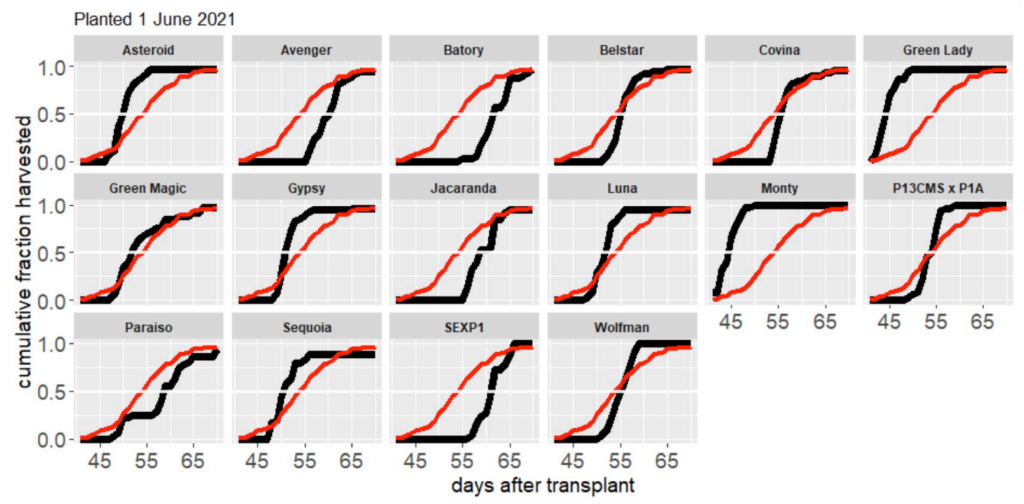
54 days, and harvest nearly complete by 65 days. The black lines represent harvest time for each variety.
In the on-farm trials, Green Magic, SEXP1, Monty, Luna, and Green Lady were all above average for earliness, whereas P13CMSxP1A, Paraiso, Covina, and Avenger were all later than average (Figure 3).
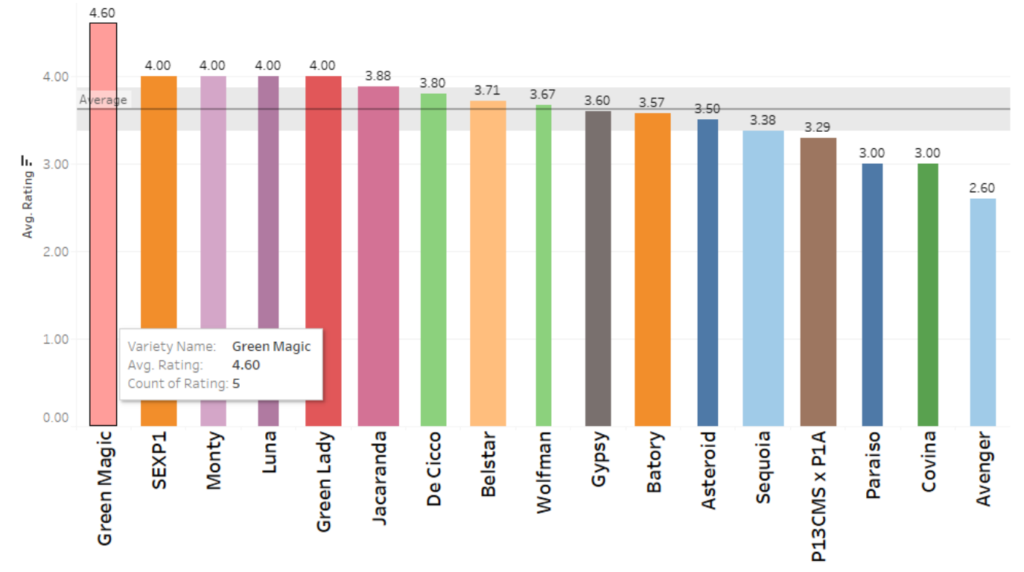
Yield: Yield was measured in multiple ways, including % of plants with marketable heads (Figure 4), head weight (listed in Table 1 below), and head weight * % marketable heads. In the early trial at SROC, all varieties except Sequoia produced nearly 100% marketable heads.
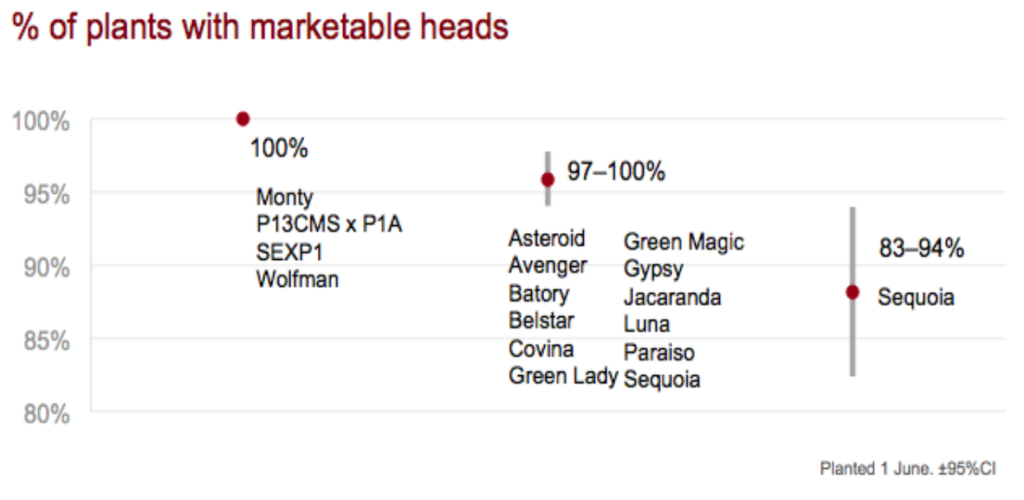
Sequoia, the variety that produced the lowest percentage of marketable heads, also produced the largest heads. While a larger head size results in more marketable pounds per acre, some growers may wish to grow smaller heads based on their customer needs. Figure 5 maps percent marketability with average head size.
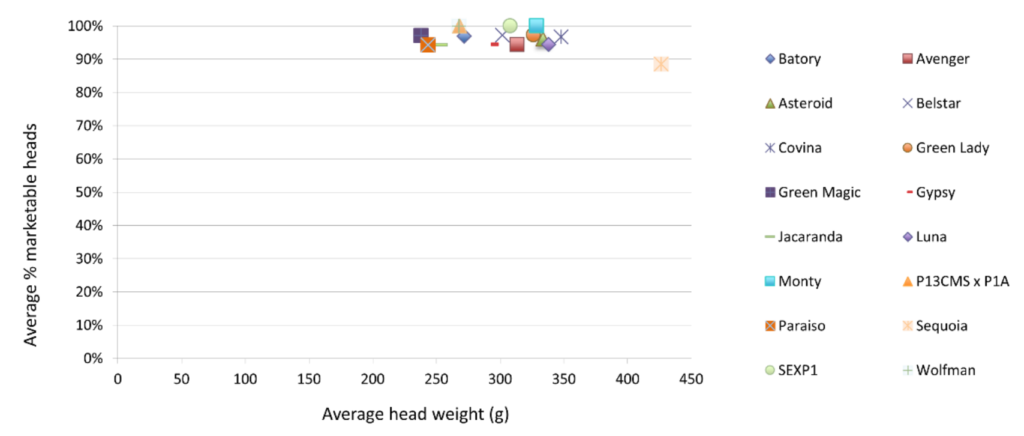
DeCicco is not listed on these graphs since it is a sprouting broccoli, and thus the head measurements did not apply. The average DeCicco plant produced an average of 2.76 heads, which were 49.64 grams each, for an average total weight of 133 grams harvestable shoots.
Finally, Figure 6 depicts grower rankings of yield. Rankings were submitted on a 1-5 scale.
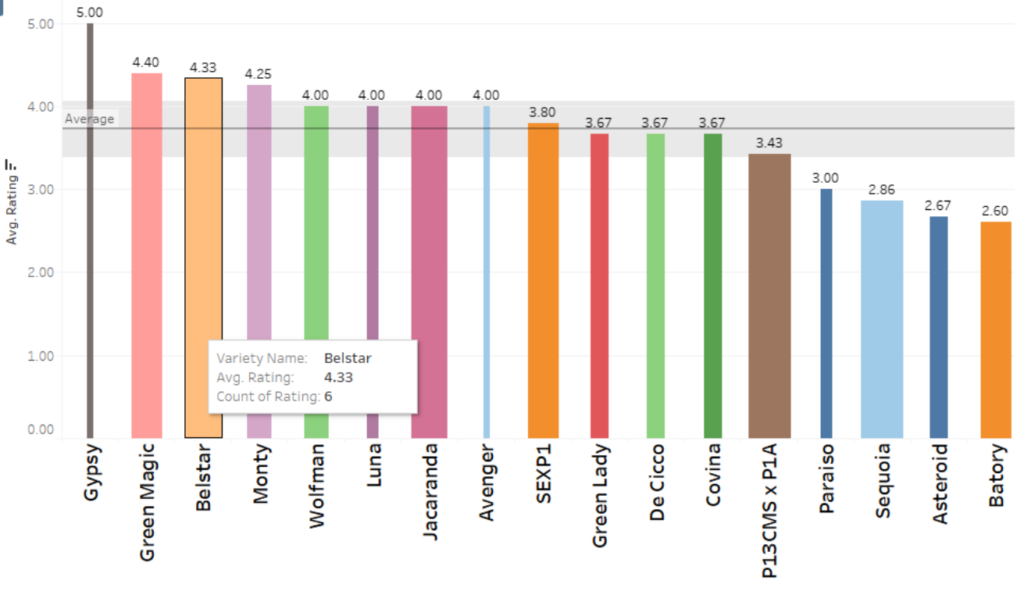
Disease: Disease pressure was non-existent in the early planted trial at the SROC due to extreme heat and drought. Farmer participants reported significant differences in disease tolerance (Figure 7). These results should be considered with caution due to regional differences in precipitation, with many areas included in the trial experiencing extreme drought. Differences in disease pressure may have been more attributable to local weather conditions than variety performance. Since growers only received 3-6 varieties each, not all varieties were trialed in all locations.
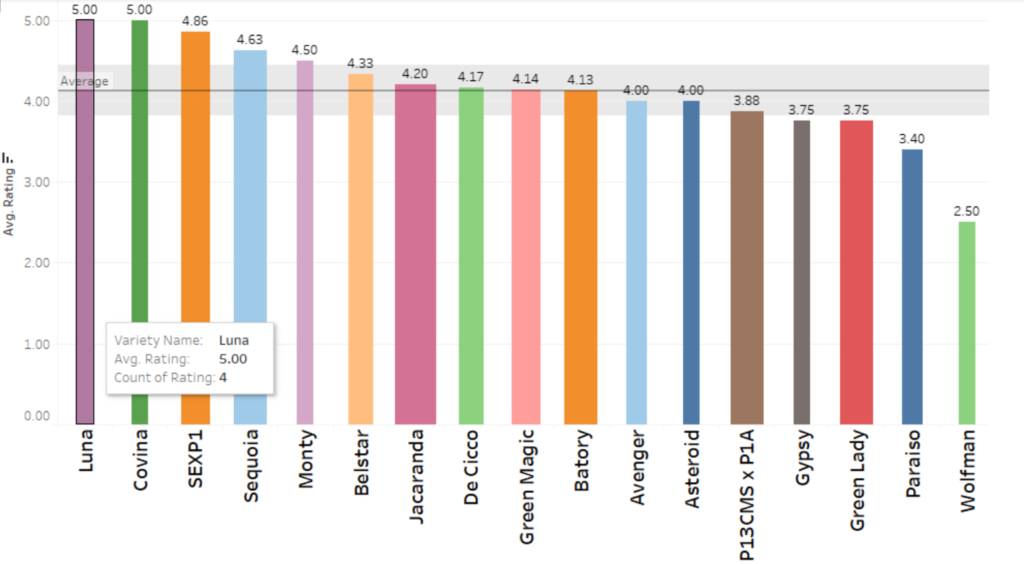
Additional Characteristics – Early Planting: The following characteristics were also measured in the SROC trial. Alternaria and Black Rot rankings are not listed because they were “0” for all varieties.

On-Farm Broccoli Trial Results on SeedLinked – Early Planting: View basic charts, grower comments and images by variety. We highly recommend logging into your existing SeedLinked account or creating an account when viewing the results so that you have access to filtering by hardiness zone to zero in on varieties that performed well in your location. Additionally, we recommend checking out our blog ‘Digging into SeedLinked Trial Results‘ to learn about all the ways you can filter and view trial results.
Late Trial: July 1 Planting
Earliness: There was significant variability in earliness and harvest duration again in the later planted trial at SROC (Figure 9). Due to disease pressure and other issues, many varieties were not 100% harvested. The earliest varieties were Asteroid, Green Magic, Luna, and Monty. Expo, Fiesta, P13, and Paraiso were notably later. Some varieties ripened very evenly, with all plants producing heads within a short period of time (e.g., Asteroid, Green Magic, Imperial, Lieutenant, Luna), whereas a few were less even, with harvests spread out over weeks (e.g., P13). In general, the varieties in the later planting matured more evenly.
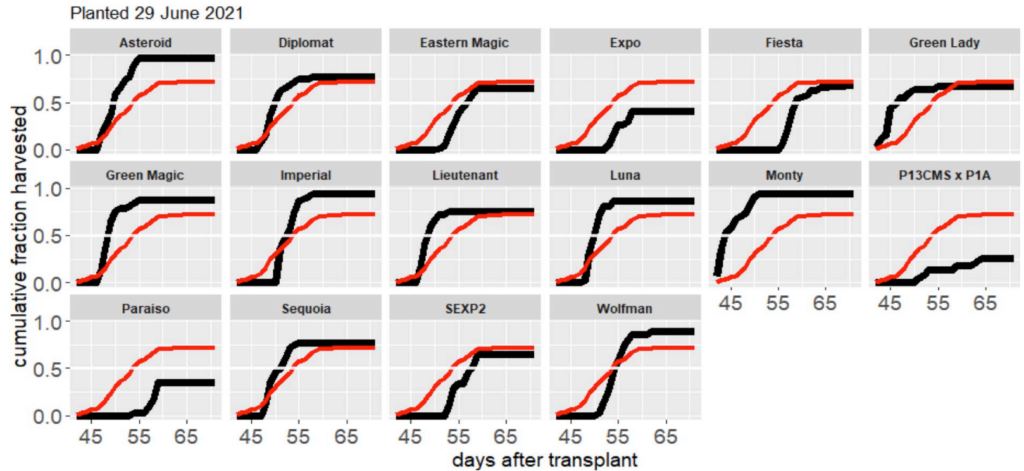
On-farm earliness results were fairly similar (Figure 10). Asteroid and Lieutenant were notably later in the on-farm trials than at SROC. Sequoia was earlier in the on-farm trials. Packman is listed as the earliest variety; this variety was not formally part of the trial and thus was not reported from SROC, but growers were invited to submit reviews for additional varieties.
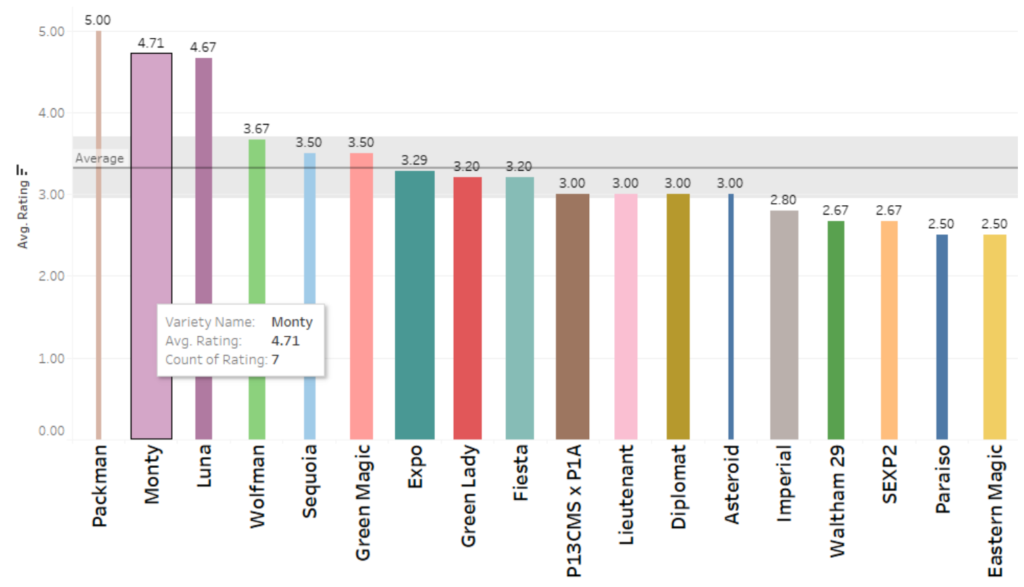
Yield: Yield was measured in multiple ways, including % of plants with marketable heads (Figure 11), head weight (listed in Table 4 below), and head weight * % marketable heads (Figure 12). In the later trial at SROC, most varieties performed significantly worse than in the early trial. The group of varieties with the best marketability included Asteroid, Green Magic, Imperial, Luna, Monty, and Wolfman. Figure 11 depicts a wide range of marketability. This is due to differences from plot to plot; each variety was replicated four times, with 9 plants per plot.
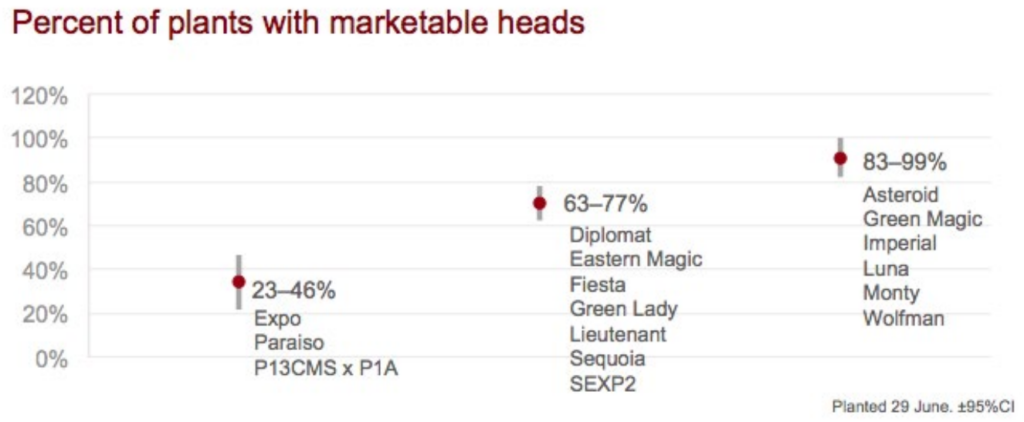
Figure 12 depicts the average head weight multiplied by % marketable heads, to show the average marketable pounds of broccoli heads per plant. Overall, head size trended slightly larger in the later planted trial than in the early trial, and there was much more variation in marketability due to increased black rot, Alternaria, and brown bead.
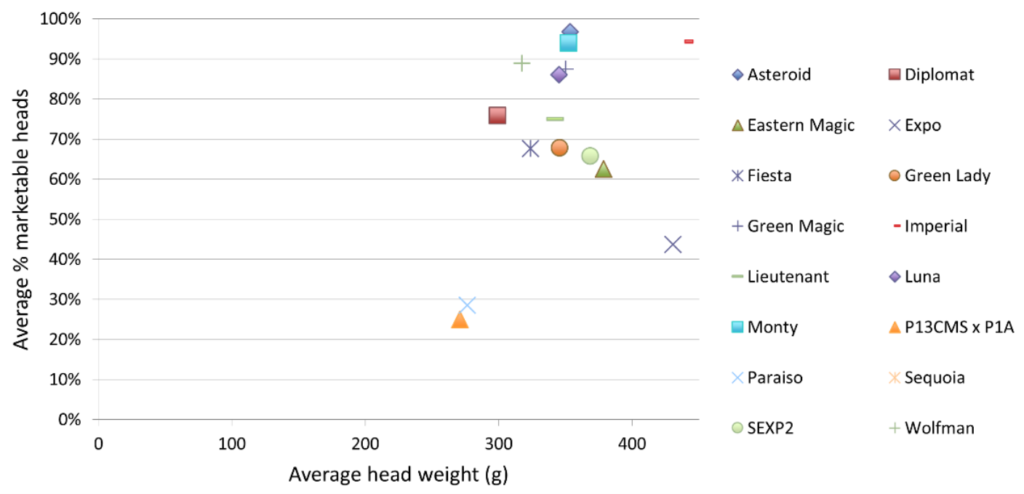
Waltham 29 is not listed on these graphs since it is a sprouting broccoli, and thus the head measurements did not apply. The average Waltham 29 plant produced 3.09 heads, which were an average of 234.45 grams each, for an average total weight of 468.91 grams harvestable shoots.
Finally, Figure 13 depicts grower rankings of yield in the later trial. Varieties that performed better in the on-farm trials than the SROC trial include: SEXP2, Packman (not included in SROC trial), and Expo. Luna performed worse in the on-farm trials than the SROC trial.
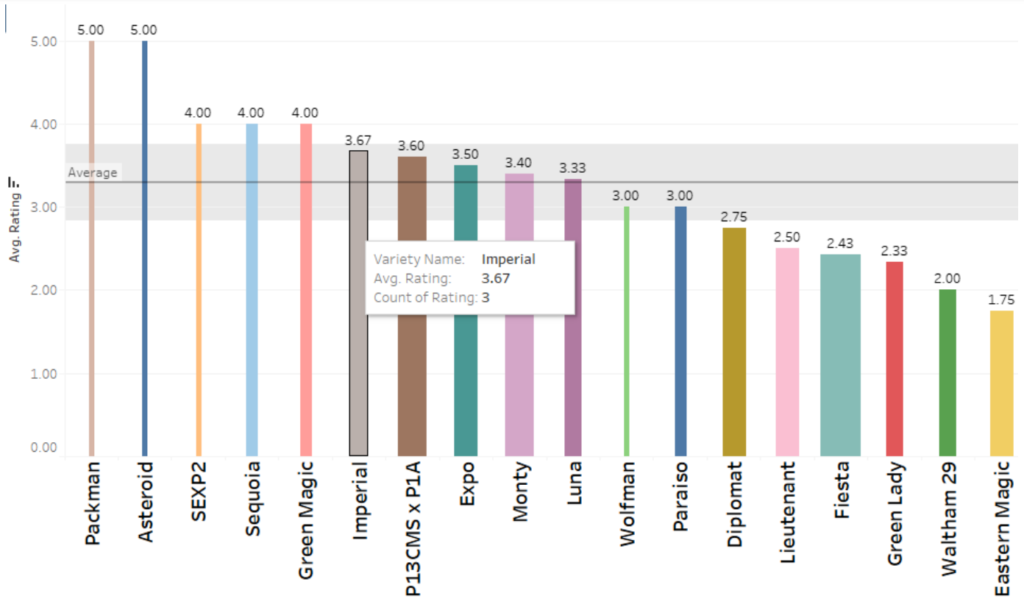
Disease: Disease pressure was significantly worse in the later planting. At SROC, Alternaria was more prevalent than black rot. Figure 14 shows overall disease rankings; Table 4 below includes individual rankings for each disease. In the SROC trial, only two varieties had no disease pressure in the heads: Asteroid and Imperial. Many of the varieties experienced a low rate of disease pressure around 10%. Expo and Paraiso had notably less tolerance, with around 60% diseased heads on average.
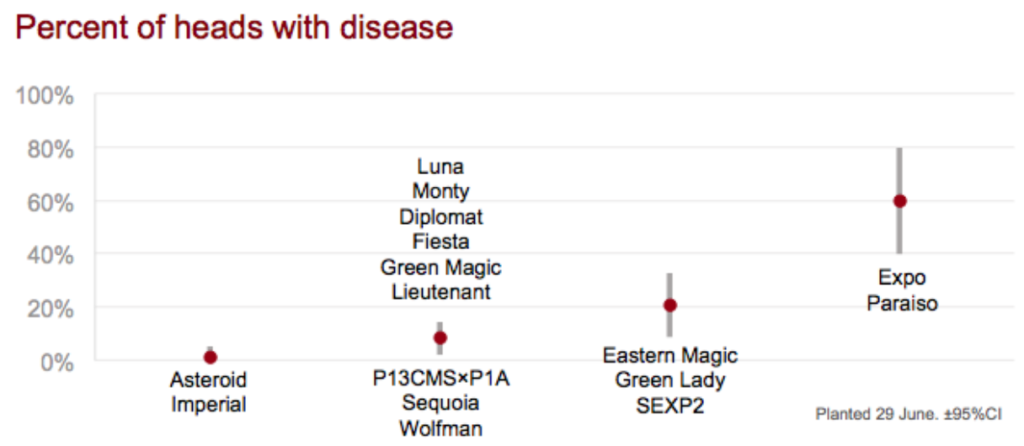
Farmer participants also saw significant differences in disease tolerance. (Figure 15). In the grower trials, Asteroid only had average disease tolerance, and Imperial was just slightly above average. SEXP2 had the highest tolerance in the grower trial, which contrasts with the SROC results, where 20% of the heads experienced disease pressure. Luna, Diplomat, Monty, and Imperial had the most consistently high disease tolerance rankings across both
trials.
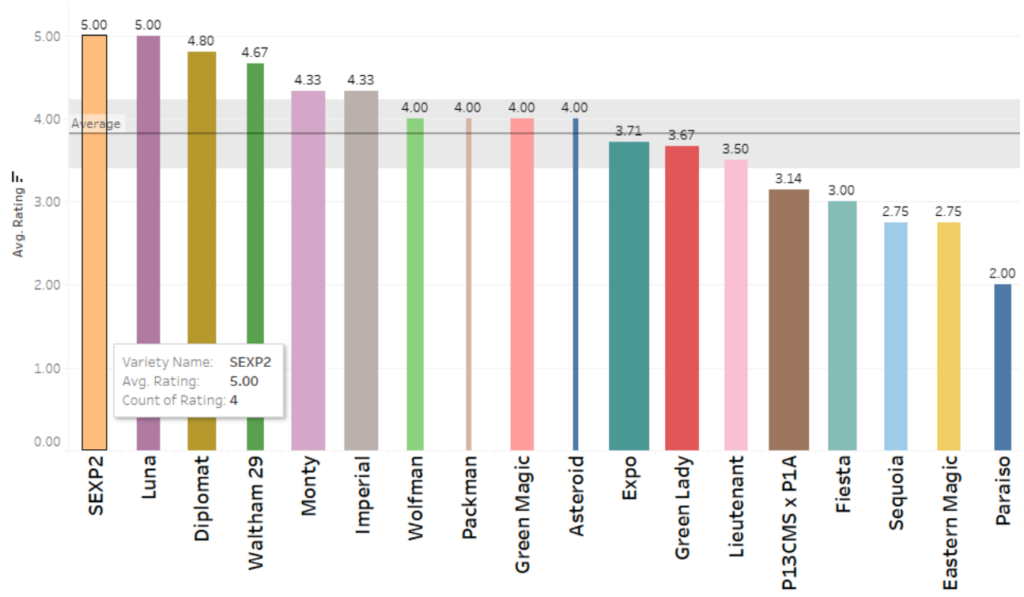
Additional Characteristics – Late Planting: The following characteristics were also measured in the SROC trial.

On-Farm Broccoli Trial Results on SeedLinked – Late Planting: View basic charts, grower comments, and images by variety. We highly recommend logging into your existing SeedLinked account or creating an account when viewing the results so that you have access to filtering by hardiness zone to zero in on varieties that performed well in your location. Additionally, we recommend checking out our blog ‘Digging into SeedLinked Trial Results‘ to learn about all the ways you can filter and view trial results.
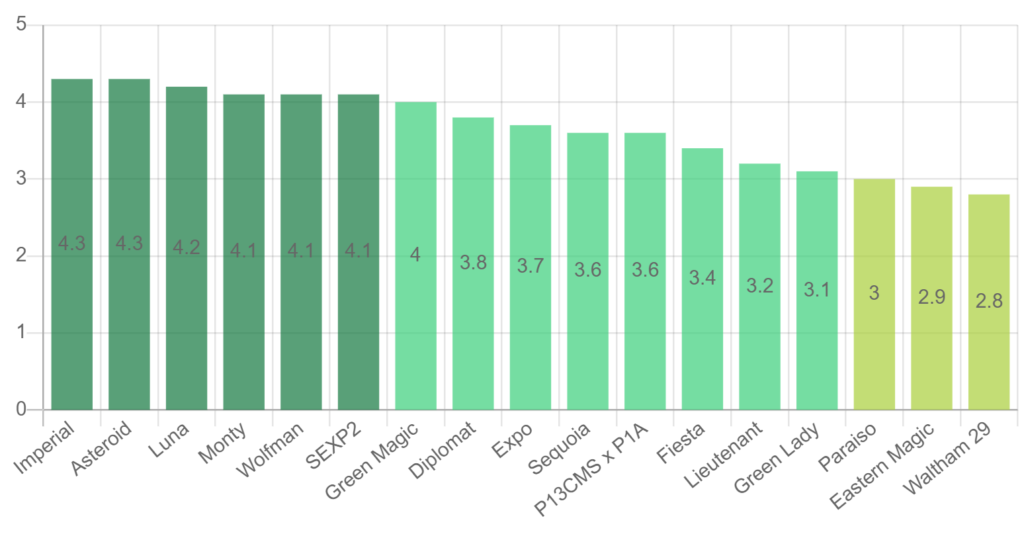
If you’re interested in joining our 2022 Midwest Broccoli trials or being part of other trials on SeedLinked, check out our current available collaborative trial sign-up list here.
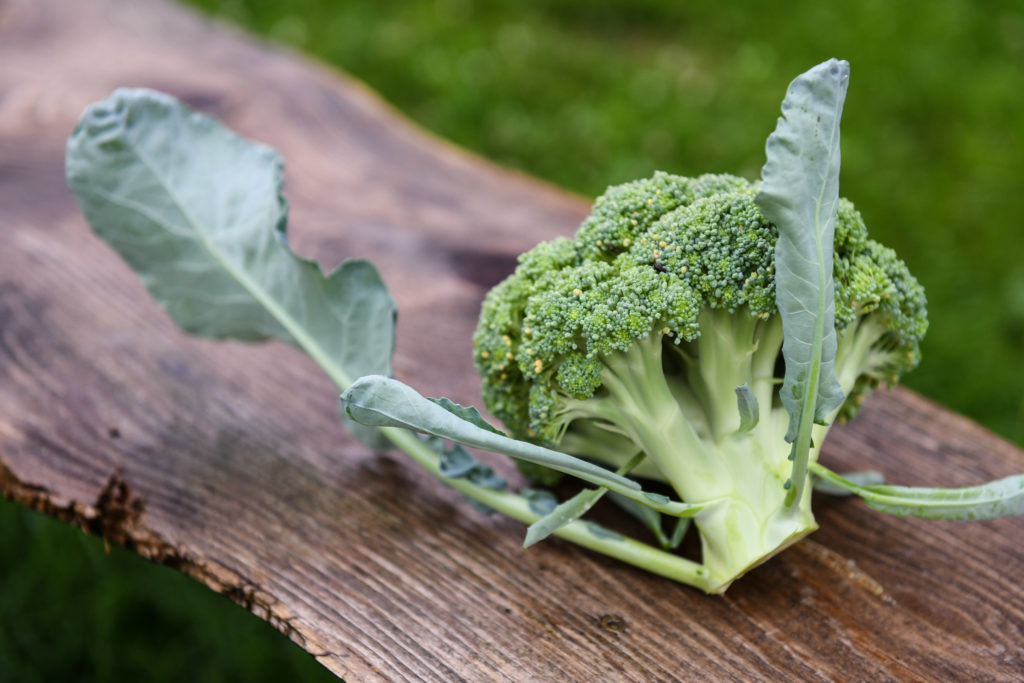
Published on 1/19/22

